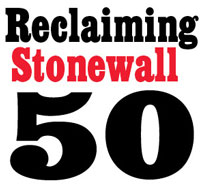 In July 2018, Secretary of Education Betsy DeVos visited an elementary school in Pennsylvania to talk to parents, teachers, and school leaders. A year before, DeVos’s Department of Education had rescinded Obama-era guidance that allowed students to use the bathroom that corresponded to their gender identity. In a congressional hearing about the guidance, she was asked if she knew that the stress of harassment and discrimination of trans students could lead to poor performance in the classroom and depression. Her response: I do know that.
In July 2018, Secretary of Education Betsy DeVos visited an elementary school in Pennsylvania to talk to parents, teachers, and school leaders. A year before, DeVos’s Department of Education had rescinded Obama-era guidance that allowed students to use the bathroom that corresponded to their gender identity. In a congressional hearing about the guidance, she was asked if she knew that the stress of harassment and discrimination of trans students could lead to poor performance in the classroom and depression. Her response: I do know that.
What the secretary likely did not know when she visited the elementary school in Erie was that she would be joined inside the meeting by School Board member Tyler Titus. Titus made history in 2017 when he became the first transgender person elected to public office in Pennsylvania. As a father of two, he ran on a platform of ensuring all school policies had a positive and direct impact on students—the people who mattered most. After his meeting with the secretary, he said he hopes she remembers the faces of the children she met in Erie and understands the impact on them when she makes a decision or wipes out guidance meant to protect vulnerable students.
As usual, the secretary faced a barrage of protesters outside the school—people angry about the treatment of vulnerable students, the weakening of student-loan forgiveness programs, and the outrage of having an actual billionaire working as secretary to privatize public education. And, as usual, she did not acknowledge her critics. But there was immense power in her sitting across from Tyler—a man with legal authority over the students of Erie and a representative of a community her policies negatively impact.
As we celebrate the 50th Anniversary of Stonewall, a newfound wokening has more LGBTQ people finally recognizing the bravery and fierce leadership of transgender people and LGBTQ people of color in 1969. Twenty years after Stonewall, famed activist Sylvia Rivera was interviewed on NPR along with a New York Police Department officer to give her firsthand account of the uprising. After she described the moment when she and other queer and transgender patrons had had enough and began to fight back, she said: “That’s when you could tell that nothing could stop us at that time or any time in the future. Today, I’m a 38-year-old drag queen. I can keep my long hair, I can pluck my eyebrows, and I can work wherever the hell I want. And I’m not going to change for anybody. If I changed, then I feel that I’m losing what 1969 brought into my life, and that was to be totally free.”
The legacy of bravery and fierce leadership that Sylvia Rivera brought to Stonewall is now being displayed on the campaign trail, with transgender people and people of color running for office—and winning—in parts of the country thought impossible just a few years before, like Virginia, Arizona, New Hampshire, and Pennsylvania. At the LGBTQ Victory Institute, we like to remind people that if you are not at the table, you are likely on the menu. Which is why we are dedicated to recruiting and training LGBTQ leaders across the country to run for office.
The outrage that Sylvia Rivera and others felt just before Stonewall may also feel familiar now. The ban on transgender people serving their country, the deaths of LGBTQ people being held in camps while they seek asylum, and the suicides of queer children bullied to death may have us all looking for the nearest brick to throw. But one cannot deny the justice in School Board member Tyler Titus staring down Betsy DeVos and forcing her to see transgender people as people—even for one meeting. When Victory released its first Out for America report in 2017, there were only two out transgender elected officials nationwide. Today there are 20, including four state legislators. While those numbers are still dire, each trans person or out person of color that is elected has an outsize impact on the issues most affecting our lives.


